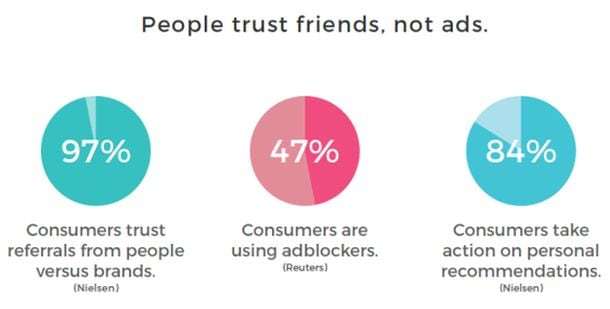Enter Social Nature, a two-year-old business that helps brands reach target [unpaid] consumers [not paid bloggers or ’influencers’] who will review their products and then share their comments – good, bad or ugly - on social media.
The brainchild of Vancouver based entrepreneur Annalea Krebs, Social Nature has recruited an army of almost 200,000 users (93% female, 40% millennials, 40% in Canada, 60% in the USA) that have agreed to sample and review new natural and organic products, and is working with more than 100 brands from start-ups to multinationals that want a more efficient way to test the market, get consumer feedback, create a buzz, or demonstrate engagement to retail buyers or potential investors.
Participating brands include Larabar, Clover, Daiya, Lightlife Foods, Ezekial, Grainful, Goodbelly, Munk Pak, Raincoat Crisps, Veggemo, and MELT Organics, several of whom are now spending sizeable portions of their marketing budgets on the platform.
Engagement rates are on average 80%
So how does it work?
First, new products from participating brands are posted on the site and users signal their interest by ‘wanting’ them. Users that have expressed an interest must then fill in short questionnaires to determine whether they are target consumers for the product.
Brands are then able to send a selected number of these target consumers physical samples or coupons that can be redeemed at stores near where they live. Engagement rates – whereby a user tries the product, reviews it, AND shares that review on social media - are 80% - which is unprecedented, says Krebs.
“If you give out free coupons to consumers that express an interest in your product at a show, you don’t get redemption rates anything like that. And our users aren’t just consuming and reviewing the product, they are going one step further and sharing their feedback, often on multiple social media platforms.”

Social Nature can track engagement via multiple social media platforms
Most of the users are social media savvy millennial Moms aged 25-34 that are looking for new natural, organic or healthy products for themselves and their families, adds Krebs, who says users can’t be forced to submit reviews, but obviously won’t get selected again for sampling if they don’t fulfill their part of the bargain.
“All users have an account with Social Nature that is linked up to their social media accounts [facebook and Instagram are the most popular] so when they post their review and share on social media we are able to track engagement – how many people they reach via social channels, which platforms they are using, and how many people in their social networks engaged with that review.”
Data to give your sales pitch a boost
So what do brands do with the feedback Social Nature users are generating and sharing?
In the first instance, they can post reviews from Social Nature on their websites or other marketing platforms, says Krebs, who charges participating brands different fees based on how many target consumers they want to ‘activate’ (engage with) via Social Nature.
Second, if the engagement is strong and the feedback positive, this information can be harnessed very effectively during a sales pitch as proof of consumer engagement, which is worth its weight in gold for new brands, especially if they don’t – yet – have a ton of sales data on which to base their arguments, she says.
“We’ve worked with small brands with products in 50 stores, and companies as big as General Mills, because it doesn’t matter how big you are, consumer feedback an engagement is invaluable.”

A wealth of consumer insight
Third, she says, the sheer volume of insights that emerge from the reviews makes Social Nature an increasingly important research tool, as it gives brands concrete qualitative and quantitative data on which to base decisions on branding, packaging, pricing or positioning.
For example, it might be that the feedback on a given product is universally positive, but Social Nature reviewers consistently say that the price is a bit too high, or that they would like a different pack size, or that there’s something they don’t like about the packaging, she says.
“Maybe these are things that people within your business have also been saying but didn’t have the data to prove it.”
And as the reviewers are just regular consumers as opposed to paid bloggers, they are not obliged to say nice things about the products in question, she says.
“It’s well understood that word of mouth marketing is far more effective than paid advertising [whether it’s a traditional ad or native advertising/sponsored content], while more and more people are using ad blockers, so brands are looking for new ways to reach a wider audience but in a way that is authentic.”
Converting fans into customers
Finally, given that the majority of the products are purchased by Social Nature reviewers in grocery stores near to where they live using free coupons (rather than sent directly in the mail), it is more likely to lead to repeat purchases, because users know where to go to buy them again if they like them, she says.
Similarly, as facebook reviews include links to the Social Nature site where people that are interested in the products can find ‘where to buy’ information, coupons [depending on what the brands have signed up for], or simply a link to the brand’s online store, a high level of sharing can also translate into sales, she says.
